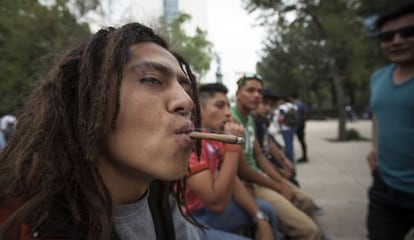Most small-time dealers arrested in Mexico City are marijuana users
The majority of those detained have greater quantities of drugs than permitted by law

The majority of suspects arrested for drug-dealing offenses in Mexico City are marijuana users.
Since 2012, when officials in the Mexican capital began cracking down on small-time dealing, a total of 9,121 investigations have been opened.
In seven out of 10 cases of those arrested for possession, the defendants were carrying more quantities of marijuana and cocaine for personal use than is permitted by law. Legislation prohibits possession of more than five grams of cannabis or more than 500 milligrams of cocaine.
Since 2012, Mexico City and all Mexican states have been responsible for investigating the distribution, trafficking and possession of narcotics in quantities that exceed the personal use limit. Four years ago, a 2009 penal code reform was introduced, which obliges state and local officials to provide medical treatment for drug consumers.
But drug dealing has increased in the capital.
In October, Mayor Miguel Ángel Mancera and 16 other government officials from the Federal District agreed on a common policy “to attack the hot spots” and reduce the number of drug-dealing crimes in the capital.
It is estimated that at least a dozen people are arrested each day in Mexico City for dealing. The sectors with the worst problems are Gustavo A. Madero, Iztapalapa and Cuauhtémoc.
It is estimated that at least a dozen people are arrested each day in Mexico City for dealing
In 22% of the investigations where authorities discovered that the drugs were destined for street sales, the suspects were found to have been dealing in discos, restaurants, bars, schools, hotels, tourist sites and residential and public areas.
The most common drugs found on dealers were marijuana and cocaine, according to the statistics provided by the Federal District’s prosecutor’s office. Marijuana use is growing in popularity.
In a study conducted by the Mexico City Institute for the Attention and Prevention of Addictions, one-third of the residents in the capital said they have a family member or friend who smokes marijuana on a regular basis.
Mexico City has been openly debating whether to legalize marijuana after the Supreme Court last year agreed to allow four Mexican members of a cannabis club to cultivate, transport and consume the plants for recreational purposes.
Since Mexico City officials have been cracking down on dealing, the number of arrests has soared
But since Mexico City officials have been cracking down on dealing, the number of arrests has soared, with some 13,000 people taken to court to face charges between August 2012 and mid-2015.
While a small number actually go to prison, six out of 10 dealing suspects are usually charged with simple possession.
The reforms to the penal code that were passed during the previous administration of President Felipe Calderón (2006-2012) seek in part to go after the small-time operations of the big criminal organizations while at the same time offering medical treatment to consumers. But the law hasn’t been able to accomplish everything.
Guillermo Zepeda Lecuona, an expert on citizen security and criminal justice, believes this policy has been a failure.
“They ended up prosecuting people who are consumers and not drug traffickers. And the medical treatment they offered is not being conducted as they promised,” he said. “At the same time, there has been no reduction in the number of organized criminal networks.”
English version by Martin Delfín.
Tu suscripción se está usando en otro dispositivo
¿Quieres añadir otro usuario a tu suscripción?
Si continúas leyendo en este dispositivo, no se podrá leer en el otro.
FlechaTu suscripción se está usando en otro dispositivo y solo puedes acceder a EL PAÍS desde un dispositivo a la vez.
Si quieres compartir tu cuenta, cambia tu suscripción a la modalidad Premium, así podrás añadir otro usuario. Cada uno accederá con su propia cuenta de email, lo que os permitirá personalizar vuestra experiencia en EL PAÍS.
¿Tienes una suscripción de empresa? Accede aquí para contratar más cuentas.
En el caso de no saber quién está usando tu cuenta, te recomendamos cambiar tu contraseña aquí.
Si decides continuar compartiendo tu cuenta, este mensaje se mostrará en tu dispositivo y en el de la otra persona que está usando tu cuenta de forma indefinida, afectando a tu experiencia de lectura. Puedes consultar aquí los términos y condiciones de la suscripción digital.








































